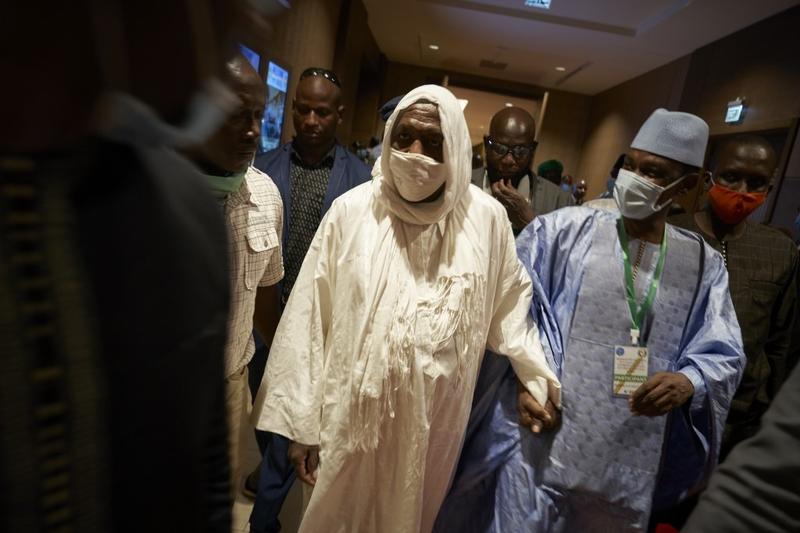 The Imam Mahmoud Dicko, center, influential leader of the opposition coalition, walks in the Sheraton hotel in Bamako on July 23, 2020. (PHOTO / AFP)
The Imam Mahmoud Dicko, center, influential leader of the opposition coalition, walks in the Sheraton hotel in Bamako on July 23, 2020. (PHOTO / AFP)
BAMAKO - One of Mali’s most influential power brokers, Mahmoud Dicko, will withdraw from politics, his spokesman said, after a meeting on Wednesday with leaders of a military coup who have promised to oversee elections within a “reasonable” time.
Mali’s President Ibrahim Boubacar Keita resigned and dissolved parliament on Tuesday after the mutineers detained him at gunpoint, further rocking a country that is in the grip of a jihadist insurgency and civil unrest.
Fearing Keita’s fall after nearly seven years in power could destabilise the Sahel region, the African Union and Economic Community of West African States (ECOWAS) both suspended Mali.
The mood in the capital Bamako was calm throughout the day and junta leaders urged people and officials to return to life as normal. But the economic fallout from the coup started to appear as investors ditched shares in Mali-based gold mining companies and Ivory Coast halted financial flows.
The mutineers met Dicko, a Salafist preacher who electrified protesters during anti-Keita demonstrations in recent weeks that drew tens of thousands of people.
Mali’s President Ibrahim Boubacar Keita resigned and dissolved parliament on Tuesday after the mutineers detained him at gunpoint, further rocking a country that is in the grip of a jihadist insurgency and civil unrest
ALSO READ: Mali president resigns after detention by military, deepening crisis
After the meeting, a spokesman for Dicko said he had decided to withdraw from politics.
Although no further details were shared, the move suggests at least part of the opposition movement is satisfied with the coup orchestrators’ promise to return to democratic practices.
A spokesman for the mutineers, who call themselves the National Committee for the Salvation of the People (NCSP), earlier said they were not seeking power.
“We are keen on the stability of the country, which will allow us to organise general elections ... within a reasonable time limit,” Colonel Ismael Wague said on state television.
In response, the M5-RFP opposition coalition said in a statement it had taken note of NCSP’s commitment to the transferral of power via the ballot box and would work with the group to achieve this.
The mutineers have denied reports of casualties from Tuesday’s unrest, but human rights group Amnesty International said it had documented the death of four people, while 15 more were wounded by bullets.
A Malian security source identified three of the other junta leaders who appeared alongside Wague as Colonels Sadio Camara, Malick Diaw and Modibo Kone.
Wague described neighbouring armies, France’s anti-jihadist Barkhane force and a UN peacekeeping mission as “partners for stability and restoring security”.
Stark Choices
On Wednesday, the United Nations Security Council condemned the mutiny and urged the soldiers to release all government officials and return to their barracks.
The 15-member council had earlier been briefed by UN peacekeeping chief Jean-Pierre Lacroix, who told them the UN’s Mali mission “remains committed to playing its mandated role ... but the country must swiftly regain a measure of institutional stability and Constitutional order.”
Michael Shurkin, a former CIA officer now with the Rand Corporation, said the upheaval risked distracting Malian forces from their fight against jihadists linked to al Qaeda and Islamic State.
“The UN, EUTM (European Union Training Mission) and French have spent billions. What now? Is the answer just to walk away?” he asked.
Mali has struggled to regain stability since a Tuareg uprising in 2012 that was hijacked by Islamist militants.
Keita, 75, was elected in 2013 following a coup the previous year, promising to bring peace and stability and fight corruption. He won a second five-year term in 2018.
Following months of protests over corruption allegations, at least 14 people were killed in July in demonstrations called by the M5-RFP.
ECOWAS, which had sought to mediate between Keita and his opponents, said it planned to deploy a fresh mission to Mali to ensure a return to democracy and scheduled an extraordinary virtual session of heads of state for Thursday.
On Wednesday, the finance ministry of Ivory Coast - French-speaking West Africa’s largest economy - ordered the suspension of all financial relations with Mali, in line with an ECOWAS decision in response to Tuesday’s mutiny.
READ MORE: Mali holds election despite coronavirus and insurgency
‘His own fault’
Anti-government protesters had poured into Bamako late on Tuesday to cheer the mutineers.
“I am against coups, but they become necessary if leaders are inflexible. What happened to IBK (Keita) was his own fault,” said 43-year-old motorcycle mechanic Namory Konate.
People and traffic circulated as normal on Wednesday, although many shops, banks and public buildings remained closed following looting.
Videos on social media had shown Malians running unchecked through luxury compounds in the city, including properties belonging to the justice minister and Keita’s son.
Gold mining firms, including Mali’s largest miner Barrick Gold, said they were operating as usual and staff were safe, but traders sold shares because of the increased political risk.


